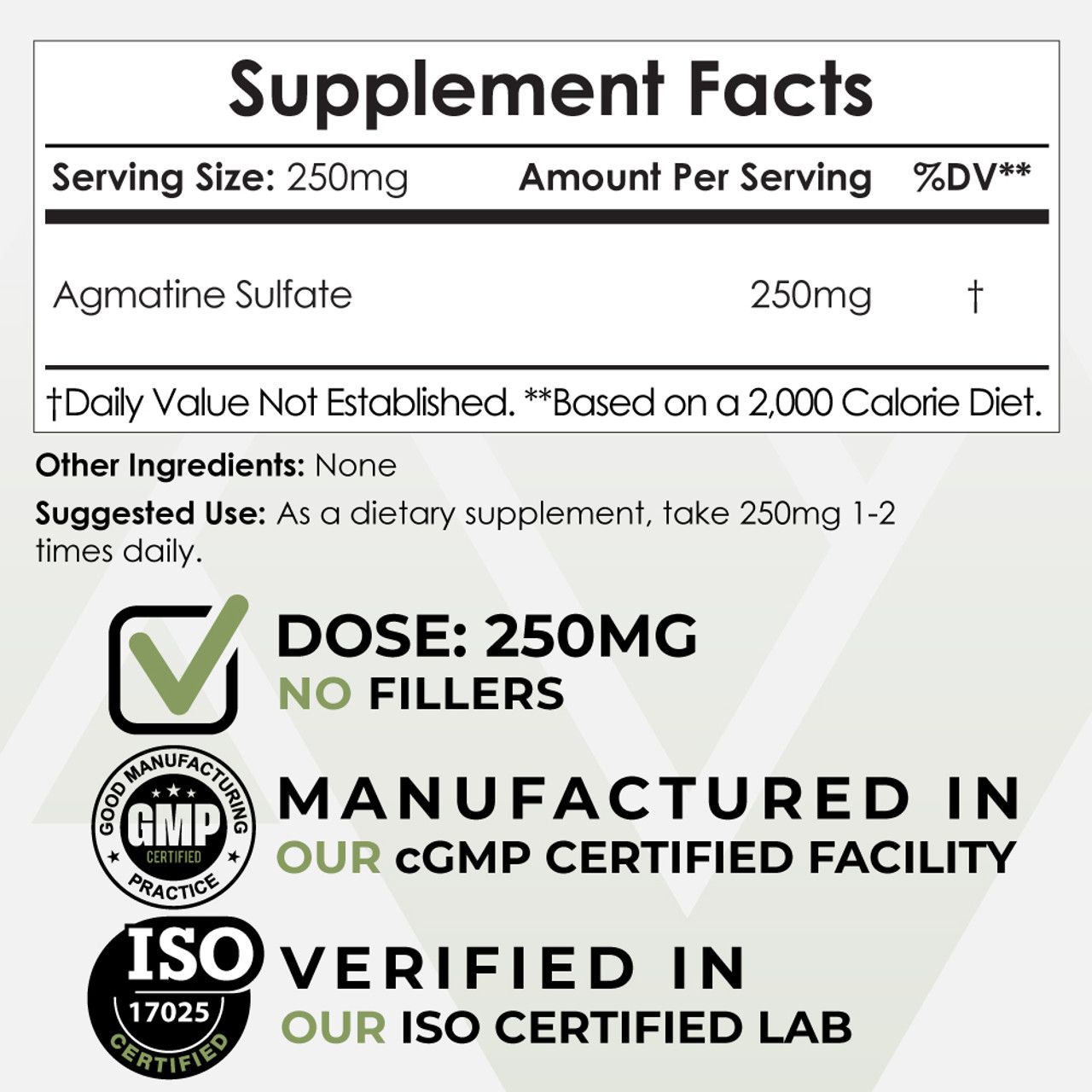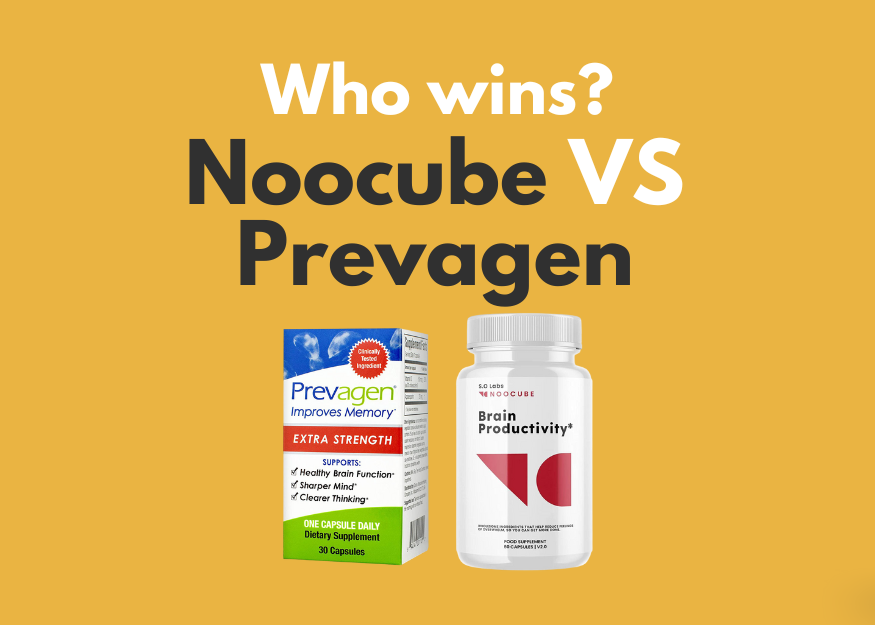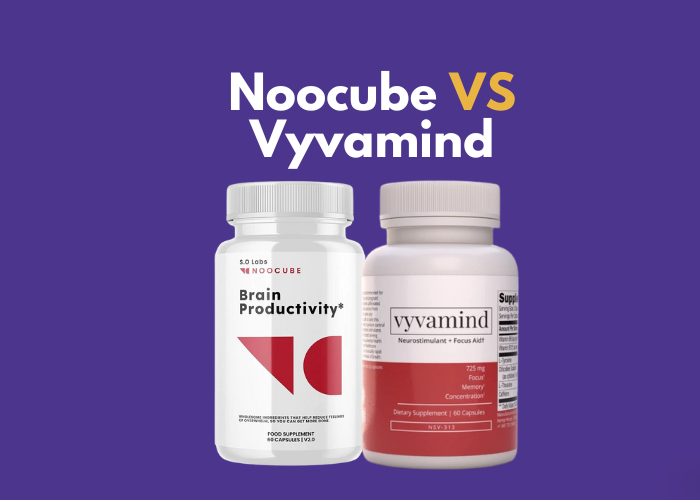Agmatine is a lesser-known supplement that offers a wide range of potential health and cognitive benefits.
What is Agmatine?
Agmatine, also known as agmatine sulfate, is a chemical substance and metabolite of the amino acid L-arginine. It was first discovered in 1910 by scientist Albrecht Kossel and is found naturally in bacteria, plants, invertebrates, and mammals, including humans.
In the body, the enzyme arginine decarboxylase converts arginine into agmatine. It can also be produced by bacteria in the gastrointestinal system. Agmatine is considered a neuromodulator in the brain and plays a role in neuroprotection. Studies show agmatine levels increase during times of stress.
How Does Agmatine Work?
Agmatine exerts its effects through several mechanisms of action:
- Modulates the nitric oxide system - Increases endothelial nitric oxide synthase (eNOS) while inhibiting inducible (iNOS) and neuronal (nNOS) nitric oxide synthase. This improves blood flow and reduces inflammation. (Source)
- Blocks NMDA receptors - This inhibits glutamate activity which can improve depression, anxiety, and cognitive function.
- Enhances alpha-2 adrenergic signaling - At lower levels agmatine increases alpha-2 signaling which can reduce pain and anxiety. At higher levels it blocks these receptors.
- Activates imidazoline receptors - This increases beta-endorphin levels which improves mood and reduces pain. It also explains agmatine's antioxidant effects.
- Nicotinic cholinergic antagonist - May support smoking cessation.
In summary, agmatine modulates key neurotransmitters systems involved in mental health, pain management, neuroprotection, and addiction.

Key Benefits and Uses of Agmatine
Based on its mechanisms of action, agmatine has been shown to provide the following benefits:
Rapid Antidepressant Effects
- Has fast-acting antidepressant effects similar to ketamine
- Increases BDNF which supports neurogenesis
- Enhances the effects of antidepressants like Wellbutrin and Prozac
Pain Relief
- Reduces nerve pain and sciatica
- Enhances opioid pain relief
- Lowers pain from spinal cord injury, arthritis, and other conditions
Supports Addiction Treatment
- Reduces drug and alcohol cravings and withdrawal severity
- Lessens tolerance buildup to opioids and alcohol
Neuroprotection
Protects the brain against Alzheimer's, Parkinson's, and other neurodegenerative diseases
- Reduces glutamate excitotoxicity and oxidative stress
- Improves recovery from traumatic brain injury and stroke
Other Benefits
- Mild anti-anxiety and anti-OCD effects
- Improves symptoms of autism
- May support smoking cessation
- Lowers blood glucose and cholesterol
- Increases muscle glucose uptake
Overall, the most prominent benefits of agmatine include fast-acting antidepressant qualities, pain relief, supporting addiction treatment, and protecting the brain against neurodegeneration.
Proper Dosage
Human studies use a dosage range of 750mg to 3,000mg of agmatine sulfate per day. Most people find the sweet spot to be around 1,000-2,000mg per day. Doses are typically split into two or three separate administrations.
For depression, 1,000mg twice daily - once in the morning and once at night - provides fast relief. Take doses on an empty stomach for maximum effects.

Safety and Side Effects
Agmatine has a very high safety profile. No severe adverse effects have been reported in human studies even at higher dosages. Mild side effects can include temporary gastrointestinal upset and slight reductions in blood pressure.
Agmatine does not seem to interact with pharmaceuticals except opioids, alcohol, and nicotine - where it can amplify both the benefits and side effects. It is still recommended to consult a doctor before using agmatine if you have any medical conditions or take medications.
Agmatine is an intriguing supplement offering antidepressant, neuroprotective, analgesic, and anti-addiction effects. It works by modulating nitric oxide, NMDA, alpha-2, imidazoline, and nicotinic receptor activity in the brain and body. Agmatine is well-tolerated and appears to be safe in recommended dosages. More human studies are needed, but the current research is promising. Agmatine is worth consideration for enhancing mental and cognitive health.
Sources of Information in this article
Modulates Nitric Oxide System:
- Increases eNOS, which improves blood flow via vasodilation and reduces blood pressure. Research
- Inhibits iNOS, which can be neurotoxic in high levels. Research
- Inhibits nNOS, which can impair cognitive function & neurogenesis. Research
Blocks NMDA receptors:
- Blocking NMDA receptors on GABA interneurons increases activation of AMPA receptors, which then increases BDNF for neurogenesis & synaptogenesis. Research
Enhances/Inhibits alpha-2 adrenergic (α2A) receptors:
- Agmatine functions as a positive allosteric modulator at low concentrations and an inhibitor at high concentrations. Research
- Agmatine can potentiate morphine analgesia via enhancing α2A signaling. Research
Activates imidazoline receptors:
- Increases beta-endorphins (via imidazoline activation). Research
Antioxidant Properties:
- Agmatine activates the Nrf2 antioxidant pathway which can protect the brain versus oxidative stress, neuroinflammation, mental illness, and neurodegeneration. Research
Inhibits nicotinic cholinergic receptors:
Rapid Antidepressant:
- Fast antidepressant-like ketamine. Research
- 1 dose reverses depression in mice. Research
- 100% remission in a mini case study. Research
- Increases BDNF in the hippocampus. Research
- Enhances Wellbutrin’s antidepressant potency by 10x. Research
- Enhances Prozac’s antidepressant potency by 2x. Research
Anti-Pain:
- Reduces nerve pain by 46%. Research
- Reduces sciatic pain. Research
- Potentiates opioid pain relief. Research
- Increases beta-endorphin release. Research
Anti-Addiction:
- Reduces nicotine withdrawal. Research
- Reduces alcohol drinking. Research
- Reduces tolerance to alcohol. Research
- Reduces alcohol withdrawal. Research
Neuroprotection:
- Rescues brain insulin sensitivity. Research
- Improves learning/memory in Alzheimer's. Research
- 31% protection versus Parkinson’s. Research
- Reduces amyloid beta & tau. Research
- Reduces glutamate excitotoxicity. Research
Miscellaneous:
What foods contain agmatine?
Some of the highest food sources of agmatine include fermented foods like kimchi, sauerkraut, miso, and kombucha. Agmatine is also found in small amounts in wheat bread, fish, meat, dairy products, and certain vegetables like potatoes, carrots, and mushrooms.
Can agmatine help build muscle or improve athletic performance?
Some early research shows agmatine can help increase strength, power, and muscle mass when combined with resistance training. It may work by increasing nitric oxide production, boosting growth hormone, improving glucose uptake, and more. However, more human studies are needed.
Does agmatine improve gut health and digestion?
Agmatine may benefit digestive health and gut microbiome diversity since it is created by gut bacteria and concentrated in fermented foods. Agmatine has been shown in animals to help protect the GI lining and reduce inflammatory bowel disease. But more research is required to confirm effects in humans.
Can agmatine supplements be stacked with other nootropics?
Yes, agmatine is often stacked with other nootropics to enhance effects. It’s commonly combined withracetams for synergy, citicoline or alpha-GPC for acetylcholine, and L-theanine for mood and focus benefits. Agmatine may also amplify the effects of kratom or phenibut when used responsibly.
Is agmatine suitable for long-term use or is cycling recommended?
There are currently no studies on long-term agmatine use. However, since it is produced naturally in the body and research shows it is well-tolerated, extended use should be fine. That said, some people do prefer cycling agmatine 1-2 weeks on and off out of an abundance of caution.





